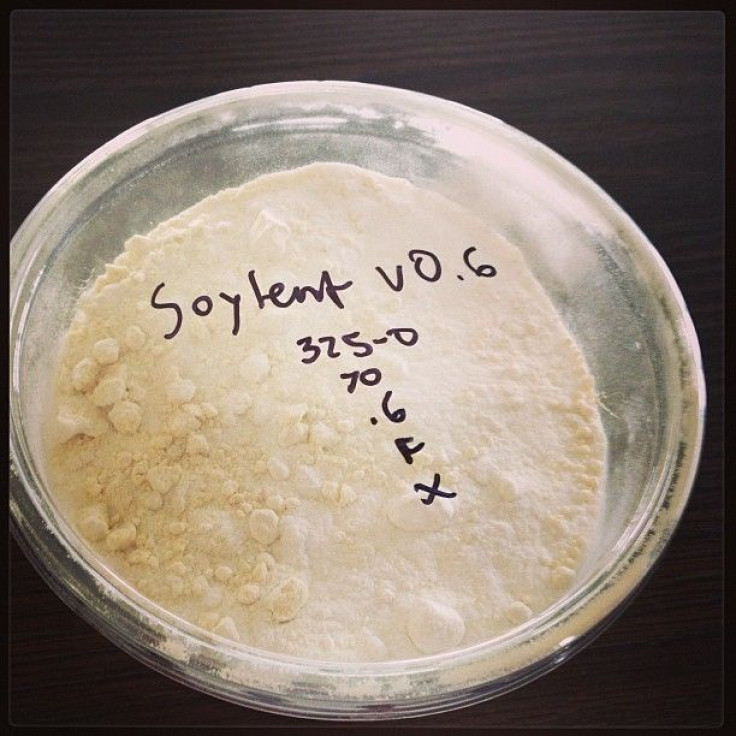Soylent Formula Coming Soon To A Mailbox Near You: Now Accepting Orders For Food Substitute [VIDEO]

After living on food substitute known as Soylent formula for three months, creator and CEO of Soylent International Rob Rhinehart claims,"I've never been healthier in my life." From the help of overwhelming support through a Kickstarter campaign, Rhinehart is set to manufacture and distribute the formula to the rest of the world, hoping to ship orders as early as August 2013.
As a 24-year-old software engineer from Atlanta, Ga., Rhinehart grew wary of the financial cost and time spent on planning and preparing meals three times a day.
"I started wondering why something as simple and important as food was still so inefficient, given how streamlined and optimized other modern things are," Rhinehart told Vice.com.
His solution: creating a food substitute formula made of raw chemical powders, starch, whey protein, and other undisclosed ingredients, which purportedly contains all the nutrition and calories needed in a balanced diet. Soylent contains amino acids, carbohydrates, fat, minerals and vitamins, with a third of the calories and no cancer-causing or toxic agents.
Rhinehart began to make headlines in March after embarking on his experiment to live primarily on Soylent. Now, after consuming Soylent for three months, he is confident enough in his product's safety and took steps to find financial backing for large-scale manufacturing and distribution.
Soylent International's Kickstarter campaign greatly surpassed its goal of $100,000 by raising $670,308 from 5,476 supporters as of June 18. People who donated higher amounts of money were given one-week to three-month supplies of Soylent to try.
So far, the only trials and experiments on Soylent have been performed by Rhinehart on himself and a small group of early adopters. He details the experience on his blog Mostly Harmless.
After three months of Soylent, Rhinehart has been able to maintain his body weight of 180 pounds. Though his body fat is low for a non-athlete at 9.6 percent, he solves his fat deficiency by supplementing with bacon.
On a trip to Los Angeles, Rhinehart returned to eating standard food for a week, but felt his cognitive capacities diminish. He felt himself becoming more impatient, his senses dulled, and he lost motivation to go to the gym. But his mental faculties and motivation to be active returned soon after continuing to his Soylent-based diet.
An early adopter quoted on his Kickstarter campaign website also echoed its mental health benefits, saying that "the cognitive effects are extremely noticeable, in fact the most noticeable for me."
Rhinehart said he did experience some joint aches, which he attributed to a deficiency in sulfur. The deficiency, Rhinehart explained, was evident in the fact that his flatulence no longer contained the usual characteristic sulfur odor. He adjusted his formula accordingly. Other adjustments included adding more fiber and creatine.
His intention isn't to replace food as we know it, but rather recognize the difference between food for fuel, and food for leisure. Rhinehart still eats regular food from time to time, saying he appreciates food more for its flavor. Now that he gets his caloric needs addressed with Soylent, he no longer craves high-calorie foods like pizza and cheeseburgers, but instead discovered a new love for sushi.
As David Renteln, vice president of business development, said in the promotional video featured below, "I love food, I just don't need 21 nice meals a week."
Much of the hype surrounding Soylent is because of the hope it will address food insecurity issues throughout the world. Distributed in a powder form, the food substitute requires no refrigeration, no cookware, and doesn't spoil.
Its benefits could extend beyond addressing hunger. Aside from freeing up time spent on cooking, Rhinehart noticed a decrease in his water and electricity bills as well. Optimizing the process from food to consumption could lower sanitation requirements demanded by the food industry and liberate many women from spending a long time hovering over stoves.
"Soylent is probably not going to solve hunger, obesity, and health in one fell swoop. But I certainly think it could help," Rhinehart writes. "And I certainly think these problems are worth working on."
In response to criticism from foodies, who often enjoy devoting time and energy to creating delicious, nutritional meals, Rhinehart invites them to consider whether the rest of the world has the means to do the same. Even if food production and preparation do remain largely unchanged, people could stand to benefit from having a choice between standard food and a nutritious, convenient alternative.
"We should solve the biological and logistical problems behind health and food security, and then focus on making foods that are altogether new and wonderful."



























